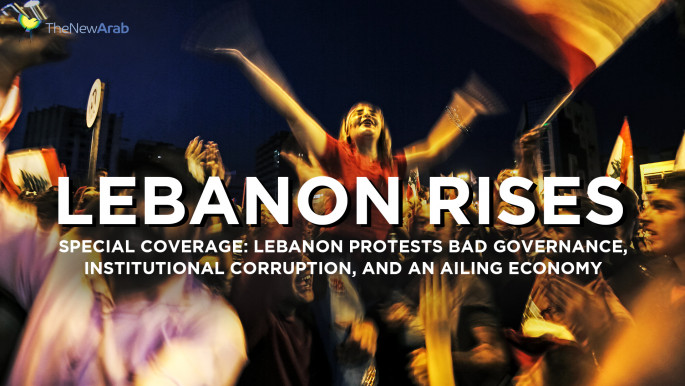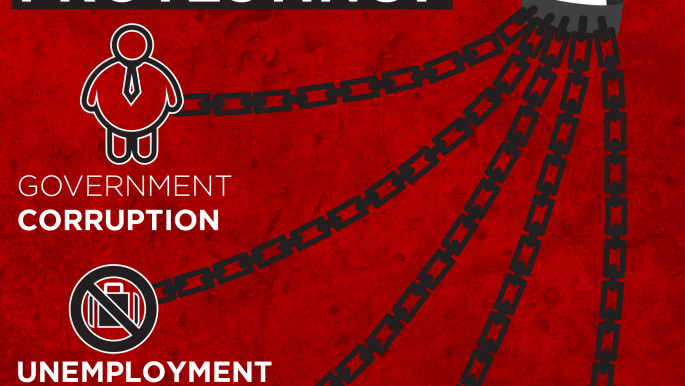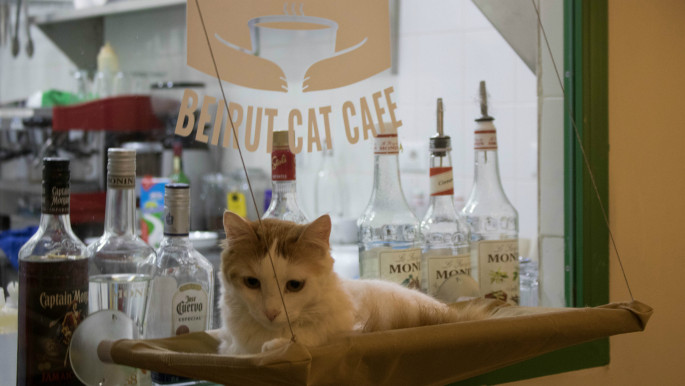 |
|
Follow us on Twitter and Instagram to stay connected
Since the start of Lebanon's months long revolution, protesters have utilised alternative media platforms, such as Facebook and Twitter, in order to broadcast information globally about what is happening in the country.
This has also led to the creation of reporting outlets, like Thawra TV, who constantly publish videos online about the protests, even when the rest of the media turns off their cameras.
Tarek was one of the founders of Thawra TV and told The New Arab that the project started as just a hobby, but quickly turned into a major operation after they started to gain a following.
"We started on the second day of the revolution to do Thawra [revolution] discussions next to the Annahar paper building," he recalled.
"Then we heard that people got attacked doing live coverage. One day one police officer told me that I can't enter this area and I said I'm press with Thawra TV. He still didn't let me in so I filmed what was happening, documenting what's happening. It started as a hobby to archive pictures and archive what was happening."
Following that, the group expanded to social media in an effort of reaching a larger global audience and has recorded video of all aspects of the protests ranging from general demonstrations to violent clashes with security forces.
 |
|
"We started Thawra TV on Facebook, YouTube and Twitter to cover the revolution to be a media platform, not like TV but just on social media," Tarek said.
"We're trying to unite people and give them space to record events, make it an open platform, create something new: 'reality revolution TV'. It's like a reality show and we have excellent footage of Saifi fights where we talked to people, went live and filmed the confrontations happening and we try to interact while we film live."
Now, Thawra TV has around 25 to 30 people in the streets taking "videos and act as 'correspondents' from various locations" in order to best "show the reality from the revolution to the people".
According to Tarek, the group has received advice from reporters at major outlets like BBC Arabia and Future TV in order to better organise their work and so that they can "move from amateurs to better but not professionals".
"We're not trying to be that," he explained, "We just care about showing reality."
Many Lebanese have found some solace in outlets like Thawra TV due to sectarian biases that exist in Lebanon's media.
"I don't really support any specific channel," protester Ahmad Helloum told The New Arab, "and most of the time I was watching Al-Jadeed even though I knew they had their agenda. I watched them because I thought they were covering as much of the revolution and, even though they are biased, I guess they tried to be as neutral as possible."
 |
We're trying to unite people and give them space to record events, make it an open platform, create something new |  |
Alice, a supporter of the protests, agreed that Al-Jadeed was the best of the local media outlets when it came to coverage, but still took issue with the Lebanese media's reporting.
"Traditional media definitely showed their bias during this time of revolution," she said to The New Arab.
"The same news was told differently on four different channels. The older generation picked to mainly watch the channels they have always watched, thus fortifying their bias. Out of them all, Al-Jadeed put the most effort into keeping us updated and was the less biased of the TV channels."
Protesters have also been critical of the lack of international media coverage.
"I didn't see a lot of international coverage," Halloum said. "I saw a general video from CNN that had to do with a lot of revolutions in the world. Non-official and people coverage is better than traditional media cause its coming from the people."
 |
|
| Read also: Businesses struggle as Lebanon's economic crisis continues |
Others found issues with the way that the local and international press documented and reported on the ongoing protests, with some people having a particular issue with how some international outlets reporting that the protests started because of a proposed tax on WhatsApp.
"Local media outlets failed to portray the reality of the revolution," Alice exclaimed. "For example OTV photoshopping images to fit their rhetoric, because whatever they displayed was doctored to benefit the politician the news outlet is affiliated with.
"International media coverage was abysmal at best. The bias against Arabs was very flagrant. They depicted us as brainless people outraged at a tax on WhatsApp while conveniently leaving out the years of corruption and economical crisis that were the root of the issue and only showed people destroying properties, contributing to the stereotype of the violent, barbaric Arab," she added.
"They chose to not display the solidarity of our people, the rise of women demanding their rights, people leaving the political parties, etc."
 |
They depicted us as brainless people outraged at a tax on WhatsApp while conveniently leaving out the years of corruption and economical crisis that were the root of the issue |  |
Due to the sectarian bias in Lebanon's media coverage, protesters believe that if this bias was to end, then it would be a major key in creating change in the country with protesters citing how social media has played a key role in aiding the demonstrations.
"I believe the second people stop watching our sectarian TV channels it would be part of the change," Halloum argued.
"Social media, especially Facebook, has done an amazing job sharing the news and the messages of events and meeting points which I think helped people join the revolution because there was a lot of interaction between large groups and people didn't feel alone going into protesters."
Alice agreed that social media has been one of the best methods of telling people about what is happening during the protests. However, it has helped spread the information not only in Lebanon, but for Lebanese expats all around the world.
"I strongly believe that we should share on our own social media what is actually going on in our country," she stated.
"My uncle in the US was only relying on media and had no idea of the gravity of the situation until he checked my Facebook posts."
However, she acknowledged that the use of social media and other alternative outlets to tell more people about what is taking place throughout the country could be just as detrimental as it can be beneficial for their cause.
"The public's view of the revolution by staying updated via social media outlets can go two ways," she admitted.
"They either see only what they want to see and solidify the beliefs they always held or they keep an open mind and try to see all kinds of different posts and verified information before shaping their opinion."
Nicholas Frakes is a freelance journalist who reports from London, the Middle East and North Africa.
Follow him on Twitter: @nicfrakesjourno
The New Arab is covering the protests day by day, offering news updates, analysis, commentary and much more. Click on Special Contents page below and follow this regularly updated section for the latest on Lebanon's uprising:
 |
|
Follow us on Twitter and Instagram to stay connected